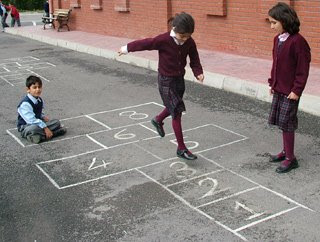
What do you like to do for fun? Do you like to swim, or ski, or camp? Do you like to read, or draw, or make things?
The ancient Greeks enjoyed running races and going to plays. The children of ancient Rome played blindman’s buff. The people of Greece and China have been flying kites for more than 2,000 years.
Today, people have fun doing all these things – and others too. People skateboard, ski, and snorkel. They watch their favourite sports teams play. They visit zoos, museums, and parks. They play thinking games, and they run, jump, and climb. It’s fun to exercise your mind and your body.
In the playground
Street games are fun! The names may change, but the games are pretty much the same on playgrounds, pavements and parks all over the world.
Do you play hopscotch? Children all over the world play it. In China, hopscotch is called Gat Fei Gei, which means “One-Foot Jumping Flying Machine”. In Italy, it’s called the Bell. In Austria, it’s the Temple. In Myanmar, children squat with hands on their hips as they jump the squares.
Hopscotch games come in all shapes and sizes. Some have 8 squares in a straight line. Others have as many as 20 squares in the shape of a snail’s shell.
Find me, catch me!
It’s Alfredo’s turn to be “blind hen”, Pedro ties a big, red handerchief over Alfredo’s eyes. Then Pedro, Inez, Maria and Juan form a circle around Alfredo. The four of them chant, “Blind hen, blind hen, what have you lost?”
“I’ve lost a thimble and a needle,” says Alfredo.
“Where have you lost them?” ask the others.
“In a haystack,” says Alfredo.
Inez turns Alfredo around three times and steps back. Now the children run up to Alfredo and tease, “Blind hen, blind hen”.
Alfredo tries to catch then. But he is confused from being turned around and blindfolded. The children dart away whenever Alfredo’s handfs come close. Then Juan gets careless – and he is caught. Now it is Juna’s turn to be “blind hen.”
Alfredo and his friends live in Peru. But “find me, catch me” ggames like blind hen are played all over the world.
Children in Rome played this game about 2,000 years ago. They called it murinda. Nowadays, children in Italy call it mosca cieca, “blind fly”. In China, it’s tsoo, tsoo. In Germany, it’s blindekuh. And in the United Kingdom, children call it blindman’s buff. What do you call it?
Many kinds of games have one person chasing and catching the others.
Quick hands, quick eyes
In the U.S.A., a game called jacks requires quick hands and eyes. Jacks, small metal or plastic pieces, are placed on the floor. A player tries to pick up one or more jacks after tossing, but before catching, a small ball.
Filipino children call the game siklot. In India, it is called guttak. Instead of jacks, Indian players use small stones.
Can you crisscross a string into a cat’s cradle? Quick fingers can, in seconds. Within a few more seconds, they can cross the strings again, and another shape appears.
Children everywhere play marbles. In some countries, children play a marbles game called ringer. Players use a big marble called a shooter to knock smaller marbles out of a ring.
Pick up sticks is another world favourite. To play, you toss down a fistful of sticks or straws. Then you try to pick up the sticks one by one, without moving any of the others.
Who’s first?
Ziggeddy, ziggeddy,
Marble stone,
Pointer, pointer, bouff!
Kisskillindy, kisskilindy,
Pa…Pa…poriff!
That’s the rhyme you use to choose who will be “It” in Trinidad, an island in the West Indies. Everyone puts a hand into the circle, and one child says the rhyme while tapping everyone’s hand. The child touched on the last word is “It”.
Almost every game starts with deciding who goes first. Is it the oldest person, the shortest, or the one with the longest hair? Or do you count around a circle saying “Eeeny, meeny, miny, moe” or “”One potato, two potato, three potato, four…”?
In Cuba, it’s:
Little white dove,
Tell me the truth,
Is it this, or this,
Or this, forsooth?
In many Western countries, China, and Japan, children often use the game called Paper, Scissors, Rock to decide who goes first. Each player makes a fist. On the count of three, the players throw their fists open, each showing one of the three items. A flat palm is paper. Two fingers are scissors. A fist is a rock.
Who wins? Rock beats scissors, by crushing them. Scissors beat paper, by cutting it. Paper beats rock, by covering it.
In Indonesia, the game is called Elephant, Man and Ant. The thumb is an elephant, the first finger is a man, and the little finger is an ant. The elephant can step on the man. The man can scoop up the ant. And the ant can beat the elephant by running up his trunk and tickling him.
Picture Credit : Google




